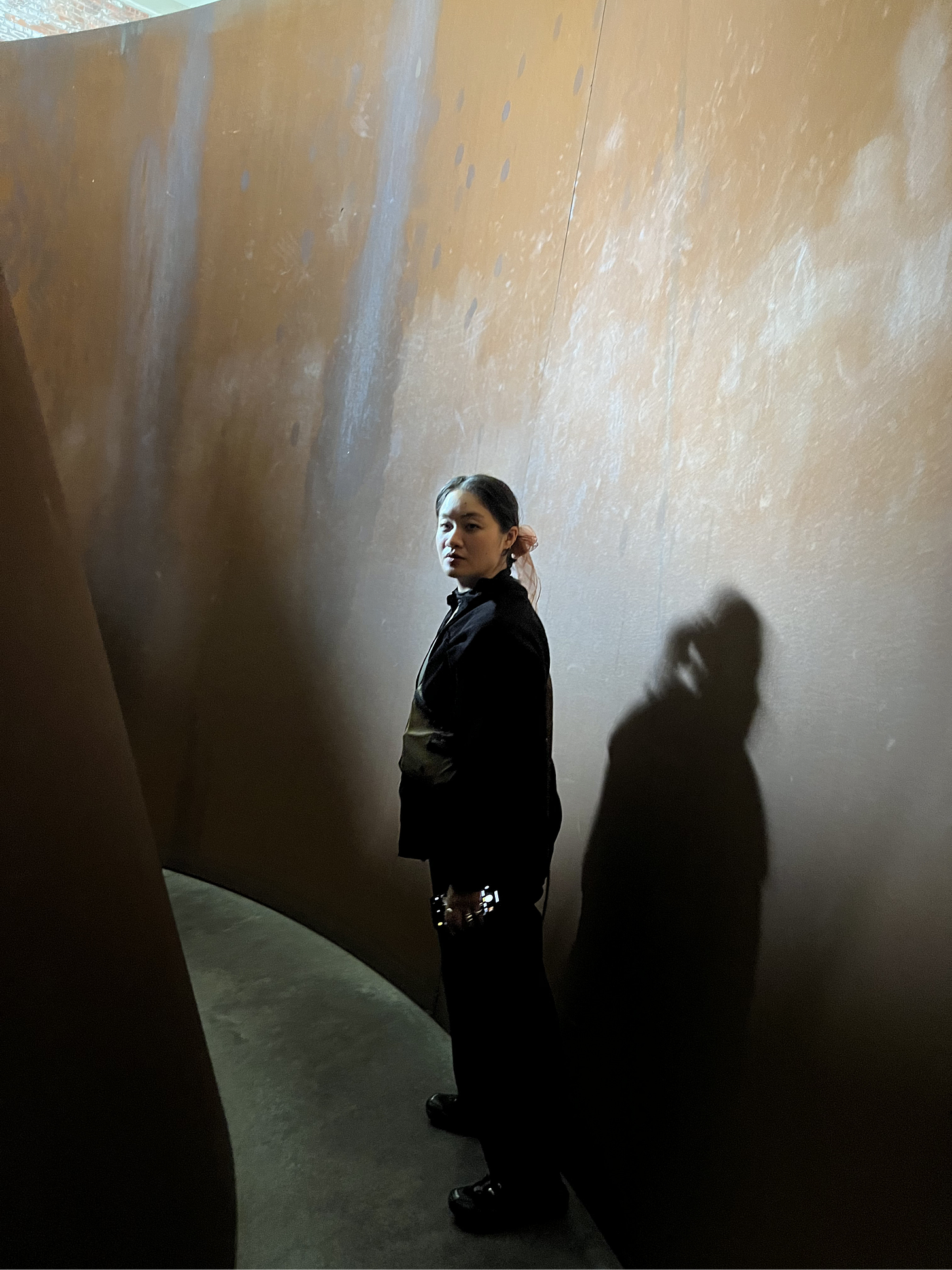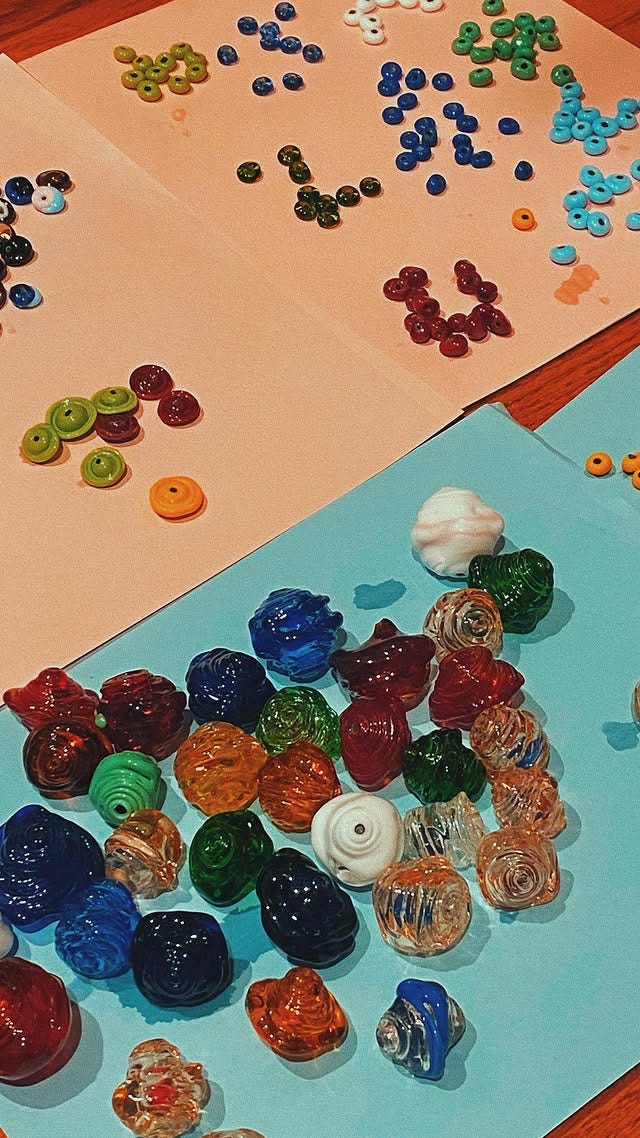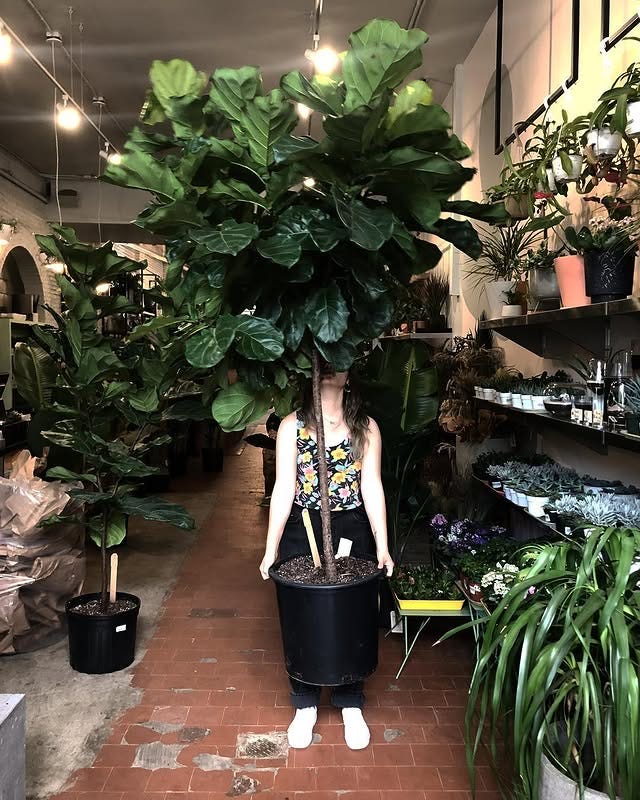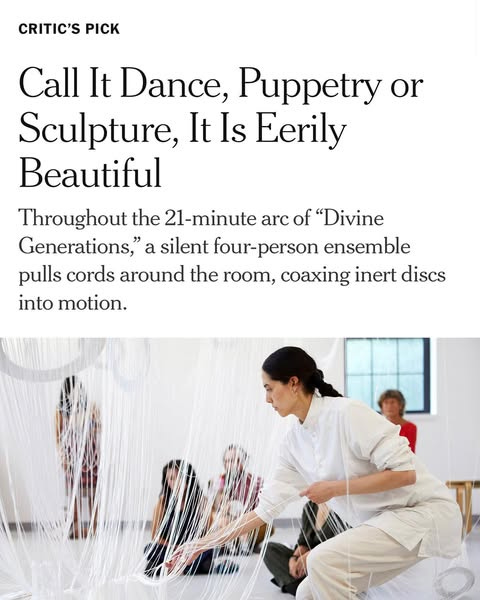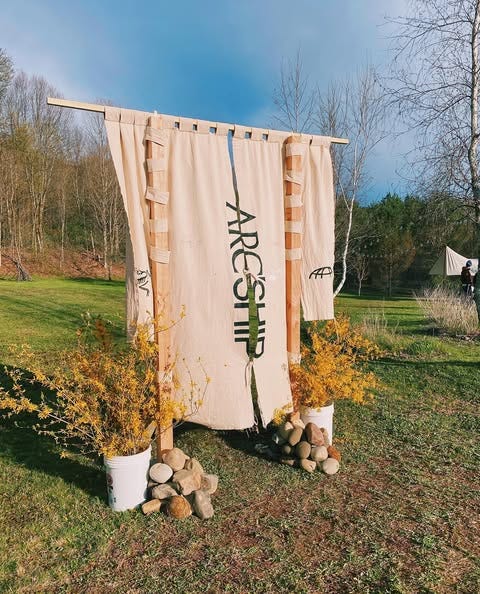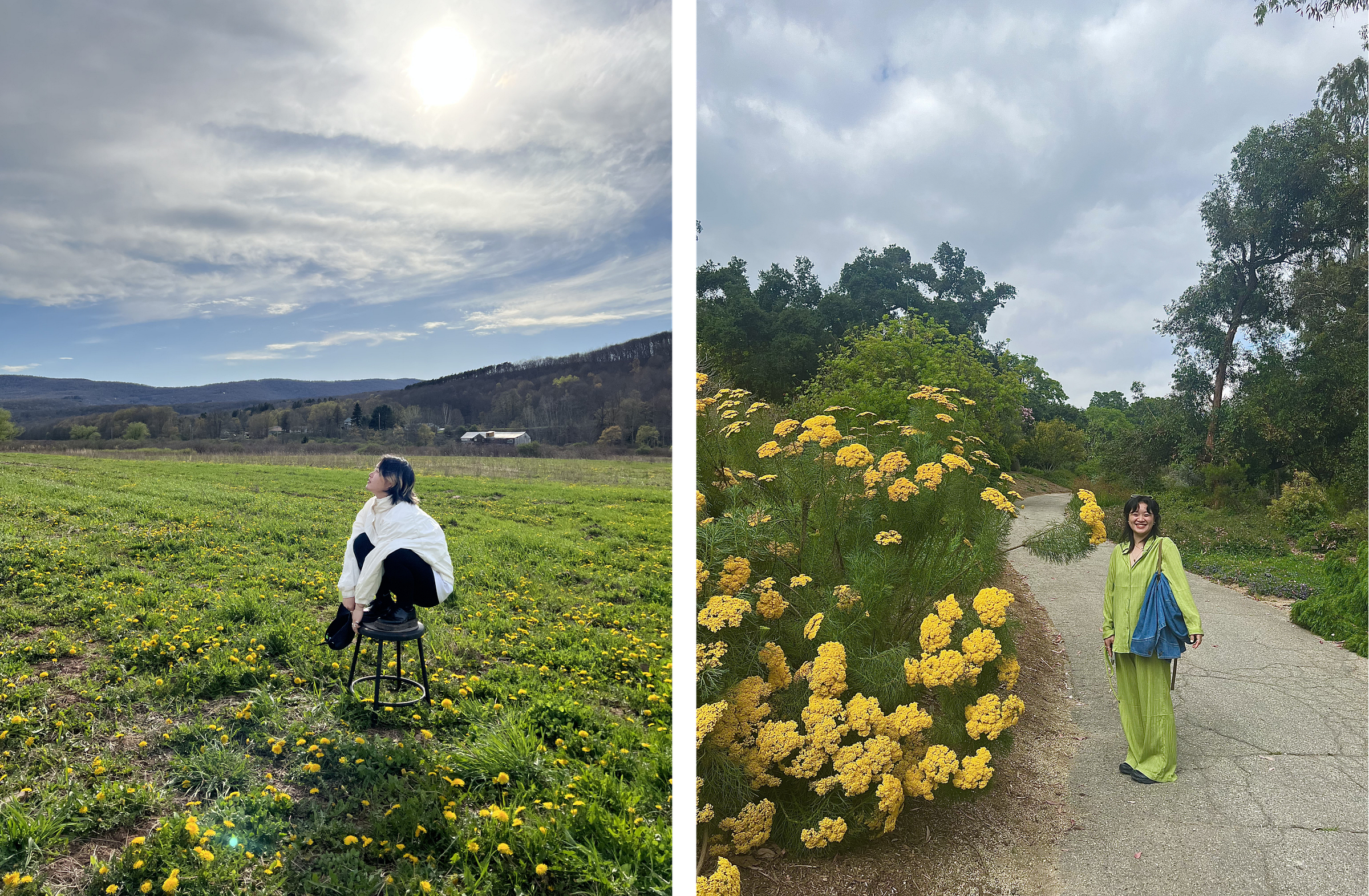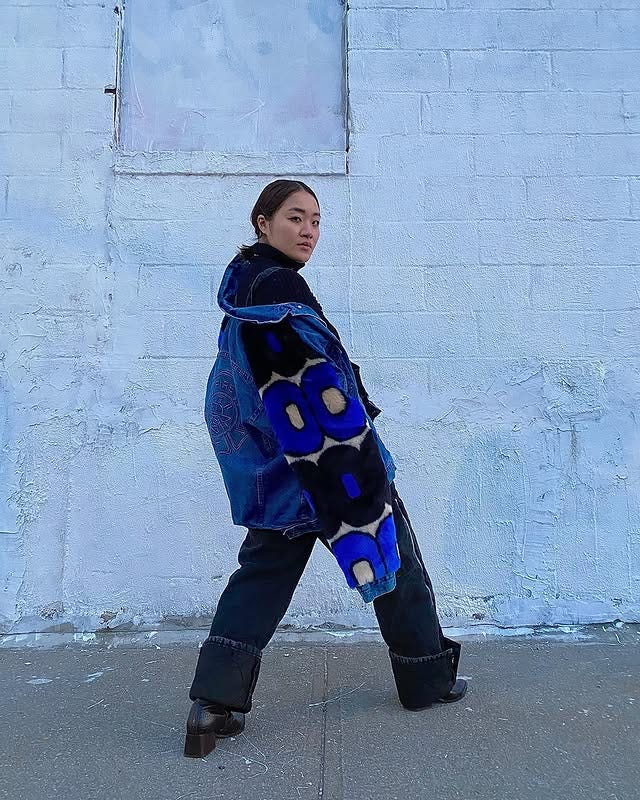Ka Yee Chan on how a nonlinear path driven by passion matters
Meet Ka Yee Chan, a Hong Kong-born, Brooklyn-based maker and third-culture kid whose creative journey is rooted in curiosity, care, and community.
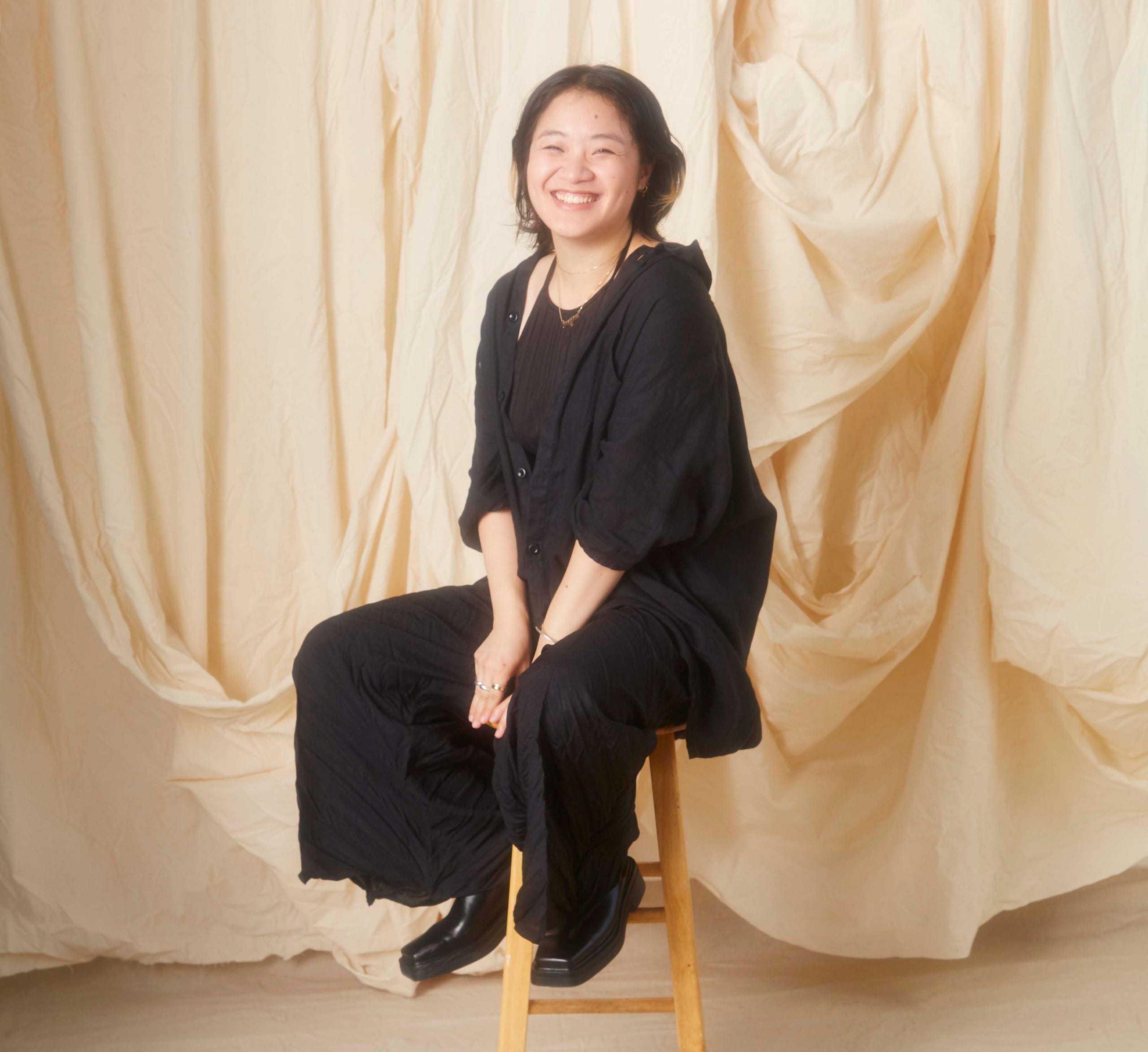
Meet Ka Yee Chan, a Hong Kong-born, Brooklyn-based maker and third-culture kid whose creative journey is rooted in curiosity, care, and community. What began as childhood art classes grew into a lifelong exploration of thoughtful design and accessible creativity. While her path from coffee shops and plant stores to hospitality and events may appear nonlinear, it reflects a deep commitment to aligning her passions with her daily life. Over time, Ka Yee found her voice in event production, where logistics meet genuine human connection. Whether she's shaping clay, curating experiences, or designing community spaces, her work centers on bringing people together. At the heart of it all is a long-term vision to build a retreat upstate where people can slow down, make, and reconnect with themselves and with one another. Ka Yee reminds us that growth doesn't have to look conventional; growing differently is still growing.
Interviewed in May 2025 | This conversation has been edited for clarity and brevity.
Please introduce yourself. My name is Ka Yee, not "Ka." My first name is two words, and a lot of people get that wrong. I'm a third-culture kid. I was born in Hong Kong but came to America when I was nine and was raised in Brooklyn.
I've always been a maker, and I love creating things. Currently, I'm an event coordinator producing cultural events.
How did you become a maker? My journey to becoming a maker began when I was nine, after moving to America. I became very shy since I didn't know the language, even though I was the same noisy kid from Hong Kong.
I learned to speak English in Hong Kong, which has given me a distinct accent and a unique way of speaking. And so, kids would laugh at me. They weren't being malicious, but it made me hesitant to talk because I didn't want to get made fun of.
My elementary school teacher introduced me to art, which became my escape as I looked forward to creating art every day. I realized I had a talent for drawing and crafting. That same teacher later recommended that I apply to a junior high school with an art specialization. Later on, I also applied to an art high school. And that's where it all started.
Do you think art is a way for you to connect with the community around you, or has it always been a solo activity? Both. I enjoy it as a solo activity because I appreciate having time to think through the process alone. It was definitely a solo activity when I was a kid because I was trying to escape from my new environment, where I had an official reason not to talk to the other kids. As I'm older, art has become more of a community thing. I enjoy sharing what I do and collaborating with others to create things.
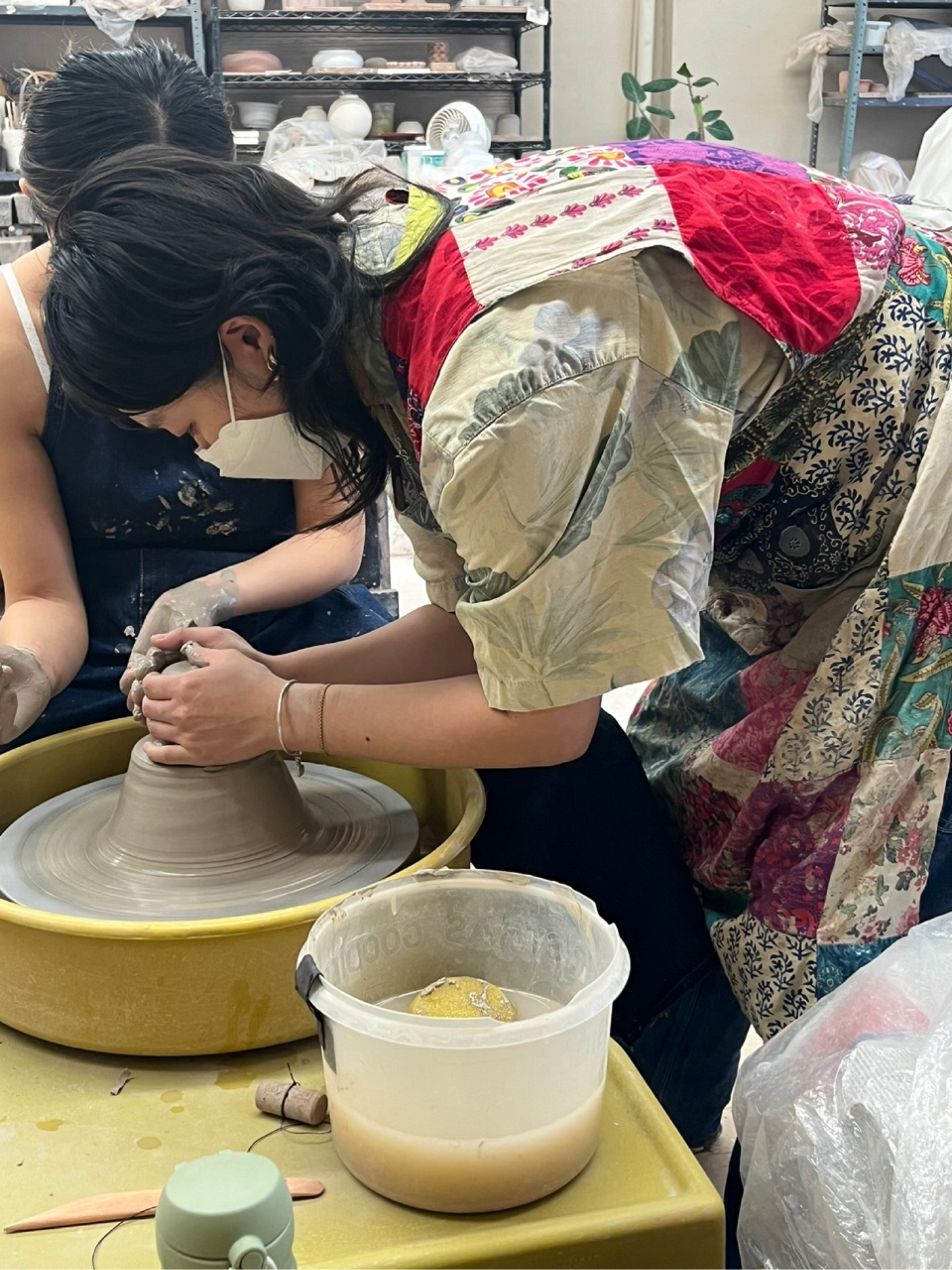
It's incredible to see how it's transformed and to see how you've integrated art into your day-to-day life. I personally never attended an art school — what was that like? Were you into specific types of art, and was there anything that shocked you about the experience along the way? That was also my first experience when I was in junior high school. I didn't know what to expect. I didn't think much about what was taught, as art was just one of the classes offered. However, that changed when I entered high school. Everyone was so talented in their own way because that particular art high school had students who were focused on art specializations.
I realized more of what I lean towards in high school: 3D and sculptural work the most. I love collages. Painting is not my strong suit.
Most of the time, I have a big picture of what I want to achieve. Then, I will start making it and will have a plan. Over time, I began to enjoy the process without worrying about the outcome. That's why I never call myself an "artist"; I don't think my brain thinks like an artist. I really like to design things. I love making things functional, even if they're a bit funky. And I usually have an end product in my head and find creative ways to take it all together.
What's your definition of an artist versus a maker? I'm unsure if I have a definition for it, but I feel cringey about describing myself as an artist. Artists are also a way of life, influencing how they think and live. It's not about producing a certain "thing." When I studied design, we often talked about function and form. Aesthetics is part of design, but it is almost secondary because the design needs to serve a purpose. Is there a problem that it solves?
I like to call myself a maker because my mind is more like a designer's mind than an artist's. To me, artists figure it out as they are in the process because there isn't an "end product." They have a vision of what they're trying to create, but it's not like one product they're trying to make functional. It's almost like their diary: a form of expression.
The word that keeps coming to mind when we speak is "moldable." Is the way you create by molding something? For example, the 3D work you do, such as ceramics, and even the present day, where you curate and host events and workshops—these are all formats where you're molding something towards a functional vision rather than having it be the canvas itself. Would you say this is how you approach being a maker or some of your work?
It may be similar to my personality, as I'm not one to express or let out my feelings. I visualize a painter with a canvas expressing themselves. That's not me; I don't think that's what you need. That's not my personality. My personality is more about play and form. Everything has a step, but I'm not strict about it. There's a process in my mind that I need to do first, so I'm going to do that. And do I have enough time to do all of this together?
For example, when creating ceramics, I realize I'm impatient because I don't have enough patience for hand-building [technique] versus the wheel. The wheel begins with a structure, and you continue from there. Once you finish the clay, you're done.
What about tools? Personally, I don't like to use a lot of tools. My art practice is pretty straightforward and simple. I feel art should be accessible. I share similar views on accessibility. One of the main reasons I dislike being categorized is that I wonder what would have happened if the teacher hadn't asked me to join the art club without seeing any talent. Then, I would never have been in it. I believe everyone should have the chance to express their creativity, whether it's creating a collage with a magazine or crafting a small air-dry clay sculpture. You don't have to be an "artist" to do crafts.
In previous conversations, we've chatted about how you started building your community in New York many years ago. Could you share how you started? For the longest time, I never really knew what I wanted to do. When I was in high school, I wanted to be a fashion designer, so I studied fashion in college. But then I realized I'm not that passionate about fashion. I love clothes and the construction of them, but I wasn't as enthusiastic as other students about this designer or that designer. What's trendy? I don't know and don't think I am interested.
That's when I realized that what I thought I would be was not really what I wanted to be. Even after I graduated from college, I didn't work in the fashion industry. I did a freelancing gig, and I really did not enjoy working there. From then on, I started eliminating what I didn't want to do.
I figured I'd try something else. I love coffee, so I started working as a barista. From there, I took on managing the coffee shop's social media and developed other skills I never thought I had.
I was also very lucky to learn social media as a skill at a time when it had just started growing. After that, I bounced around to work at shops that were mostly customer-based jobs with products that I liked. After being a barista, I worked at the plant store. I loved learning about plants and how to take care of them.
From there, I ended up in a hospitality group focused on food because I loved one of their restaurants. When I used to go, I became friends with the manager. It evolved into a role where I assisted them with social media, and then I handled brand marketing for that group.
Overall, I focused on doing jobs that combined my passions for coffee, plants, and food. The hospitality group job allowed me to wear many hats, including social media management, PR, and hosting soft openings. This job helped me realize I wanted to do events.
I feel I'm very lucky, and I don't want to jinx it. Knocks on the table. Honestly, I wasn't actively looking for any of these jobs. I always wanted to give myself a break. For example, after the coffee job, I would be walking around Williamsburg. I stumbled upon a plant store that I loved, and when I saw they were hiring, I casually dropped off my résumé. For the social media job at the hospitality group, I wasn't actively looking, but I said, "Why not?" when I was asked, since I knew how to run social media anyways. My experience evolved from there.
I've always admired your tenacity, your eagerness to enjoy life, and your willingness to learn, which has led you to form genuine connections with people. At a recent workshop that you hosted with Haco in Williamsburg, you shared with me that you met the owner because you used to walk by her shop during your breaks working at the plant store. This is another beautiful example of how your long-term connections sparked from being yourself!
To me, it also seems like you're a big people person, especially as you seek to build community. Could you share more about the ways you find to connect with other people? So when you say I'm a people person, I'm actually not. It's weird because I want to be alone most of the time. It's a funny joke with all the hospitality group friends, where we hate people! Laughing Well, we don't actually hate people, but sometimes there are just people who are tricky to deal with. No matter how solo you are, at some point, we need work and humans.
Does making connections with people matter to you, or does it just happen to you along the way? I can never work a job that I don't like. It doesn't matter how much money I earn; I would die. I think I would actually die, which is why I've ended up in jobs I genuinely enjoy. If it's something that I absolutely have no interest in, every day would be a drag. I would have absolutely no motivation—like I can't do it. Sometimes, I admire people who can actually shut that part of their brain off and go and do it. I think it's amazing, but personally, I cannot do it because, for so long, I've been free to do whatever I want and have been so lucky to be able to.
I can never work a job that I don't like. It doesn't matter how much money I earn; I would die. I think I would actually die, which is why I've ended up in jobs I genuinely enjoy.
Even at my current job, of course, there are a lot of ups and downs, but in general, it's still something I very much enjoy doing. I appreciate the balance between working on production and logistics, and on event days, I also get to connect with people. I feel a lot of satisfaction when my production and logistics plans work. That, and everyone is happy, having a good time, and understands the message of the event.
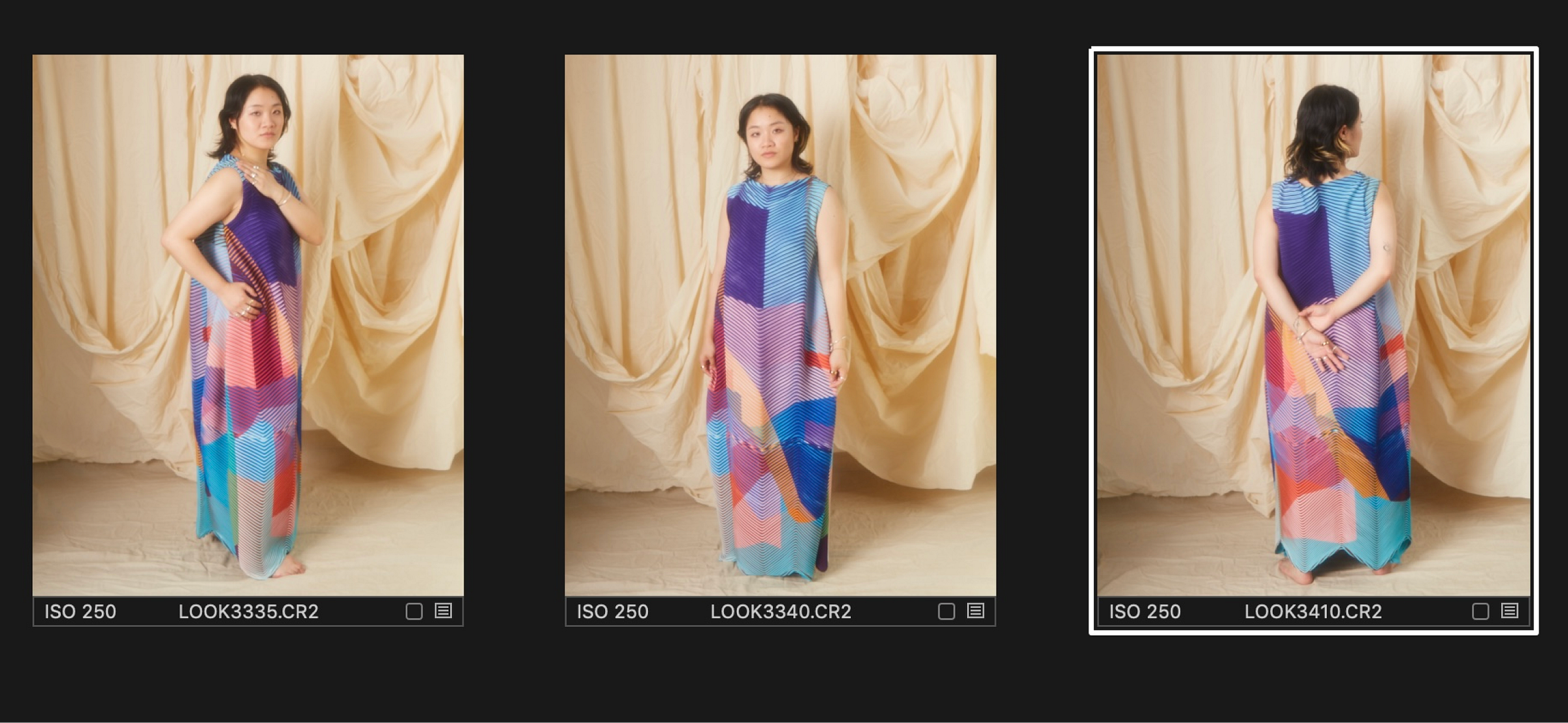
Were there any career moments, projects, or experiences that you've had that really resonated with you? Perhaps something that made you feel like you had a great time and that this is the right path for you? Yes, I curated an event called "Hungry" with the hospitality group. The hospitality group itself was most focused on opening restaurants, so there was always a focus on food. The event combined food, art, and performing arts.
The idea originated from my boss, whom I really liked working with. Back when he opened his first restaurant, he noticed he had a lot of international student customers. He aimed to create an opportunity to give back to the community by providing a platform for these international students to showcase their art. To apply for a visa, international students needed to have had their art featured in an exhibition, but realistically, many of these student artists without money would face challenges doing so. We wanted to make this easier.
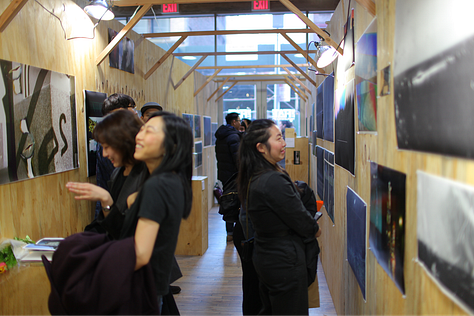
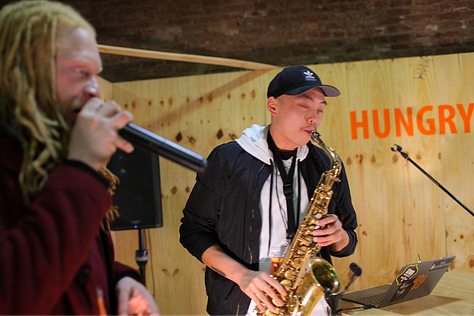
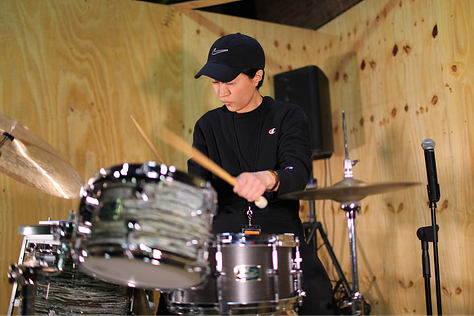
As a food hospitality group, we also wanted to include a food portion. In my mind, chefs are also artists, so they can curate and create food. This would also be a platform for chefs to think outside the box. We asked chefs to present their signature dishes interestingly. For example, one of the restaurants was Take 31. We created a wooden box made of plywood with holes to hold paper cones, displaying the fried chicken, which was their signature dish. We gave them a "canvas" to think outside the box that wasn't just about working in the kitchen and their usual service.
Since we weren't a gallery or in the art world, we accepted artists of various standards and levels. Again, our goal was to provide a platform for people to showcase their art and encourage them to continue creating while connecting with a live audience. You can talk about the food and your artwork. It's hard to find a platform on your own outside of your friends.
I'm very proud of that project, which took place in Chelsea with over 300+ people for an all-day event. I'm very thankful for that boss because it's all trust. I didn't apply for an "event coordinator role" because I was focused on social media. But he asked, and I said, "Sounds great." This connects back to your desire to make art accessible. In this case, you provided a platform for creatives who might not have been able to do so on their own. You ended up forming an environment that facilitates those connections happening more naturally.
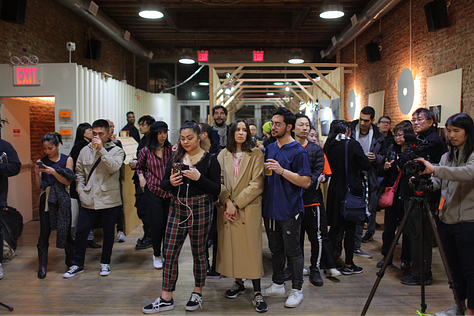
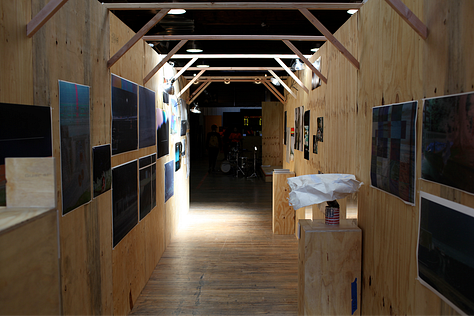
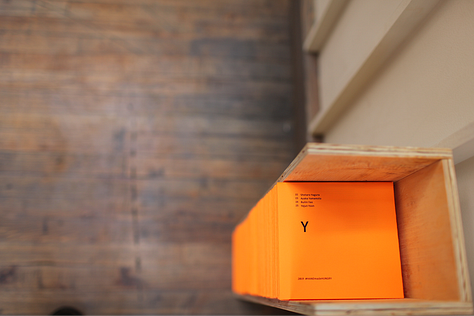
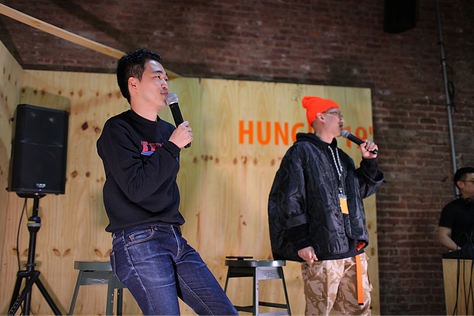
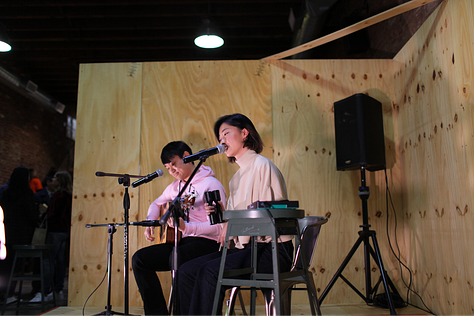
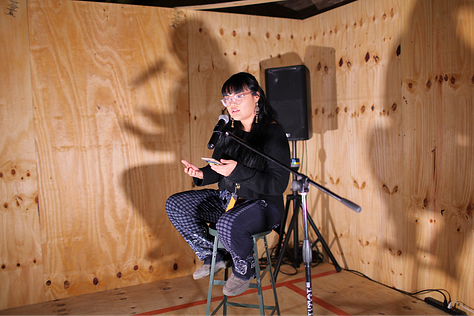
At that event, you also drew all the structures yourself and designed every single piece of it. Your boss then helped elevate you in your career because he saw your potential and trusted that you could figure it out. I honestly thought working at the hospitality group would be my last job ever because I really aligned with the boss's vision and his ideas about where he wanted to do well. And you can definitely continue to carry on that message as you grow in your career.
Where do you see yourself headed next? What's the not "grand goal" but the overarching thing you want to do? Earn money? laughing So I know obviously money is important. I loved being a freelancer for three years. I felt like that was the freest I've ever been in my entire life as a freelancer as an adult. Even though, of course, it has its own struggles.
There were times that I was like, "I don't even know what I'm making this month." But you really grow and learn a lot in a short period. So, first, I'm very proud of myself for doing that. Second, I have met so many people who have become my close friends during this period. And I really value and treasure that.
I often self-reflect to think about what I'm doing now and what I'm trying to do next. I ask myself if what I'm doing now is still serving me. Or is it at least working toward something that I want?
I often self-reflect to think about what I'm doing now and what I'm trying to do next. I ask myself if what I'm doing now is still serving me. Or is it at least working toward something that I want?
For a long time, I've really wanted to own a space to create a retreat or workshops while being my own boss. I aim to combine the skills I've gained from working in coffee, ceramics, and plants. Ideally, this space is located upstate, easily accessible by train, and serves as a place for people to truly relax and think, or not think, about life at all.
I love New York City, and it's hard to leave, especially since my family is here. But I think the city can get a bit suffocating because there's always so much going on. I want to create spaces where people can really relax and not have to plan.
I want to create and host my own workshops. I want to bring together my musician and artist friends and help create organic connections. That would be my dream. If I could save enough to make this dream a reality, that would be amazing.
I can see that all your experiences, whether freelance or in-house, bridge together your genuine curiosity, love, and interests, as well as your connection to people. I can see all of these things converging into the following hypothesis: creating and curating a space for people to continue forming those organic connections. It's very exciting as your friend and supporter to see you continue on in your journey. Maybe 10 years later! Ten years isn't too bad—this dream will come true more quickly than we realize.
At the end of the day, why do all the work you do and the future you are aiming for matter to you? From personal experience and feeling, I know there are a lot of different communities going on right now, but I feel like there can be more. I don't want these types of communities to die. Technology is advancing rapidly; people are always on their phones or watching TV. There's nothing wrong with that, but we're not really connecting and socializing with people unless we're being forced into that setting.
The goal for the upstate space is to make it a reminder for people, me included, that you can come, stay a few days, and slow down. Relearn what is important to you in life. There are so many things that we cannot control in the world, so we really need to look into the little things and the people around us. Perhaps we can go for a walk by a field with the person you're closest to, but haven't talked to in a while, because you're always busy with something else. I want to create an environment that supports and encourages that re-connection.
Do you have any advice for a younger Ka Yee? "You did a good job."
I would tell myself that it's fine to be where I'm at right now, where I'm freelancing and doing these random jobs. While it can be tricky because I'm not "technically" building a career in the same industry, and to others it may seem like I'm just "hopping around." I would remind myself that I'm simply growing differently.
When I think back on how I would put myself down at certain times because I felt like I wasn't really doing anything or growing... I would tell Ka Yee, "You did a good job. Give yourself some grace. And honestly, you work hard! Things will align once the right time is here."
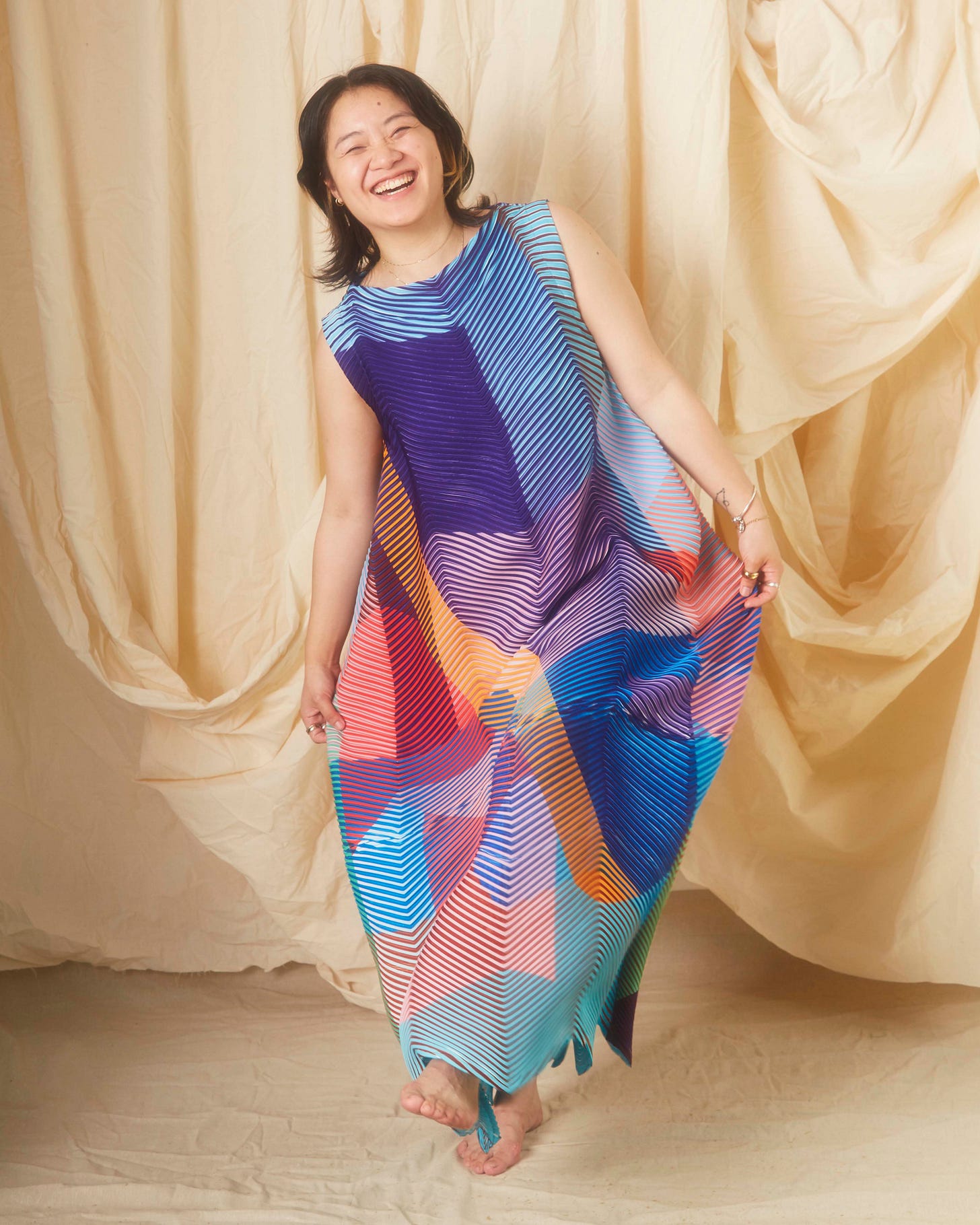
I can also see how genuine you've stayed to yourself and how that has driven you to where you are today. I also have a lot of power to think the way that I do because I learned a lot from my mother.
My mother is one of the most curious people I have ever met in my life. She's so active that sometimes I think she needs to calm down. I'm very happy for her because she's doing all the things she loves. When she was younger, she didn't have the chance to do the things she wanted because she was always working and making money for someone else. Money for her family, including her parents and cousins.
So she would always give me the power to say, "You can do whatever you want." She always told me that even though you studied fashion, you don't have to be in the fashion industry. Even though sometimes she questions my freelancing jobs, which is very understandable for traditional Asian parents, she also likes to encourage what I'm doing. She's also very supportive. Even though she might not completely understand what I'm doing, she'll always say, "Do whatever you like."
That's why I always have a mindset of, "I just need to do things that I won't regret" and "I'm just going to do it."
That's awesome when parents can encourage us. That's especially hard culturally for both of us, who grew up in traditional Chinese households and are third-culture kids. There's so much that comes from our parents' generation that they grew up in and have either learned to embody or not. My mother also doesn't let tradition dictate the decisions I make. She realized a long time ago that for her and her children to have a better future, they needed to be allowed to figure things out on their own, which is quite rare. Yes, I'm super grateful as well.
Share a list of three things you'd like to recommend. You decide the topic.
These are habits that are great to have.
Wake up slightly earlier than your work time. Just try it once, and if it works for you, it works. If it doesn't, it's okay. When you wake up, don’t look at your phone. Get up, go make a coffee, a matcha, or a good breakfast. Give yourself time to rest your mind and then roll into your day.
Play with your closet. Dressing up is fun, and now that I'm an adult with money to buy stuff, I have more freedom to try new things and have fun. Little things really add to your life. Since I work in coordination and production, I always try to dress as comfortably as possible, which can lead to wearing sweats or starting to look a little sloppy. It didn't make me feel good, so I started looking into my clothes and playing with the pieces that I had. It really adds to your life to be excited.
Take a walk. Take a walk between your days. A walk is so important. Try to take a walk while you're on a call.
Everyone is different, but these are things I'm trying, and they have been helping me build healthier habits, and I love it. This is advice I take for myself.
What song do you currently have on repeat?
TOO BAD by G Dragon ft. Anderson Paak
Back in high school, I was obsessed with Big Bang. I've recently been looping G Dragon, specifically the song he made with Anderson Paak. I really like G Dragon as an artist—and he truly is an artist through and through.
With the recent comeback album he launched, he also created a show called "Good Day" that he works on and, in some ways, has inspired me. He brings old friends and invites new friends into the community—some are chefs, some are in the acting world, and some are painters. And it's cool because they come together to make a song, and he doesn't have to do something like that. But because he has the money and power to do it, he can, and this is what he wants.
Enjoyed the Conversation with Ka Yee Chan? You can find her on Instagram @kaayeecc.
Ka Yee is also passionate about giving back to Heart of Dinner.
Heart of Dinner’s mission works to directly address food insecurity and isolation experienced by Asian American seniors in New York City. As part of this Conversation, a donation was made to Heart of Dinner.
You can support Heart of Dinner by donating directly.


